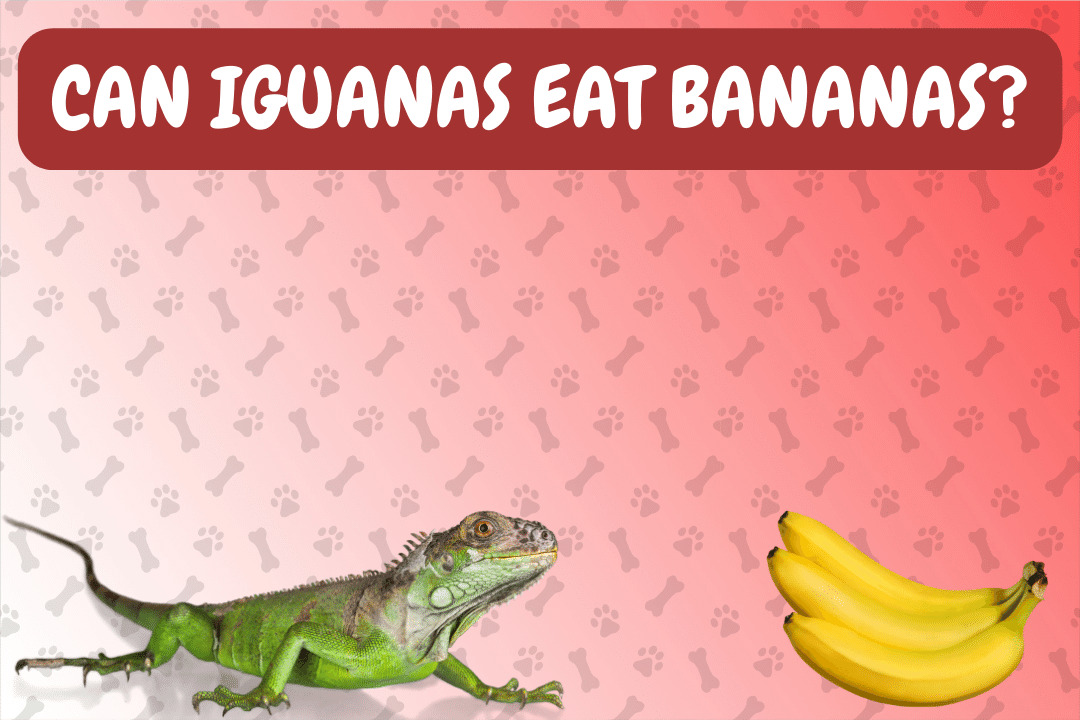No, iguanas can’t eat bananas because they have a limited capacity to digest fruits, especially those high in sugar like bananas, which can lead to health issues.
Table of Contents
Introduction
Iguanas are fascinating reptilian pets that require a specific diet to thrive. While they predominantly feed on leafy greens and vegetables, pet owners often wonder if they can introduce fruits like bananas into their diet. In this article, we’ll explore whether iguanas can eat bananas, examine the nutritional value, discuss potential risks, and provide expert recommendations for their dietary needs.
Nutritional Value
Bananas are a popular fruit among humans due to their sweet taste and nutritional content. They are rich in vitamins, particularly vitamin C and B6, and contain essential minerals like potassium and dietary fiber. However, iguanas have distinct dietary requirements that differ significantly from ours. Their diet primarily consists of leafy greens and vegetables, providing the necessary nutrients for their herbivorous lifestyle.
Potential Risks
Feeding bananas to iguanas can pose several risks:
- High Sugar Content: Bananas are high in sugar, which can lead to digestive problems in iguanas and contribute to obesity.
- Lack of Fiber: While iguanas require dietary fiber for proper digestion, bananas are relatively low in fiber, potentially causing digestive issues.
- Disruption of Calcium-Phosphorus Ratio: An imbalance in the calcium-phosphorus ratio can lead to metabolic bone disease, a common health issue in captive iguanas. Feeding fruits like bananas can disrupt this balance.
How to Serve Safely
To ensure the health and well-being of your iguana, it’s best to avoid feeding them bananas altogether. Instead, focus on providing a diet of leafy greens, vegetables, and occasional treats specifically designed for iguanas, which maintain their nutritional requirements.
Serving Suggestions
Iguanas thrive on a diet consisting primarily of dark, leafy greens like collard greens, mustard greens, and dandelion greens. These greens provide essential vitamins and minerals while maintaining the proper calcium-phosphorus ratio. Occasional vegetables like bell peppers and carrots can also be included.
Special Considerations
Iguanas have specific dietary needs, and it’s vital to meet these requirements to ensure their health. Additionally, their preferences can vary, so it’s essential to observe your iguana’s response to different foods and consult a veterinarian with expertise in reptile care if you have concerns.
Expert Opinion
Veterinarians and reptile experts generally discourage feeding iguanas fruits like bananas. A well-balanced diet of leafy greens and vegetables is crucial for their overall health and longevity. If you have questions about your iguana’s diet, consult a reptile veterinarian for guidance.
Conclusion
In conclusion, iguanas should not be fed bananas due to the potential risks associated with their high sugar content and low dietary fiber. Maintaining a diet primarily consisting of dark, leafy greens and vegetables is essential to meet their specific dietary needs and prevent health issues such as metabolic bone disease.
FAQ
Q1: Can iguanas eat other fruits?
A1: Iguanas should consume fruits sparingly if at all. Their diet should primarily consist of leafy greens and vegetables to meet their nutritional needs.
Q2: Are there any fruits that are safe for iguanas to eat?
A2: While some fruits may be fed in moderation, it’s best to consult a reptile veterinarian for guidance on safe fruit options for iguanas.
Q3: What vegetables can iguanas eat?
A3: Iguanas can safely consume a variety of vegetables, including collard greens, mustard greens, dandelion greens, bell peppers, carrots, and more. These vegetables provide essential nutrients and maintain the proper calcium-phosphorus ratio.
Q4: How often should I offer fruits to my iguana?
A4: Fruits should be considered occasional treats, and their consumption should be limited. The primary focus of an iguana’s diet should be leafy greens and vegetables.
Q5: Can iguanas eat bananas in small amounts?
A5: While small amounts of banana may not immediately harm an iguana, it’s best to avoid bananas altogether to prevent potential health issues associated with their high sugar content.
Q6: Can iguanas eat other types of fruit?
A6: Iguanas should consume fruits rarely, if at all. Their diet should predominantly consist of leafy greens and vegetables to ensure proper nutrition.
Q7: Can I give my iguana banana peels?
A7: Banana peels have the same high sugar content as the fruit itself and lack dietary fiber, so they should also be avoided in an iguana’s diet.
Q8: Are there any supplements I should provide for my iguana’s diet?
A8: Depending on your iguana’s specific dietary needs and health, your veterinarian may recommend calcium supplements or other vitamins and minerals to ensure their nutritional requirements are met.
Q9: How can I transition my iguana to a healthier diet?
A9: Gradually introduce a variety of leafy greens and vegetables into your iguana’s diet while reducing the amount of fruit offered. Consult with a reptile veterinarian for guidance on a suitable diet plan.
Q10: Can iguanas eat dried fruit?
A10: Dried fruits are concentrated in sugars and should be avoided in an iguana’s diet, as they can lead to digestive problems and other health issues.
Read more articles about Exotic Pets, on our blog.
Hello! I’m Max Walley, a pet enthusiast who knows a lot about what our animal buddies can munch on and what’s a no-no. With ‘canpeteat.it,’ I’m here to help pet owners make smart food choices. Come with me as we dive into the world of pet nutrition, discovering what keeps our furry pals joyful and in tip-top shape. Let’s explore this adventure together!


